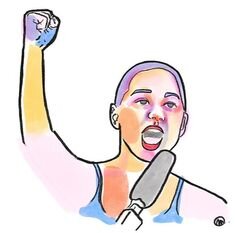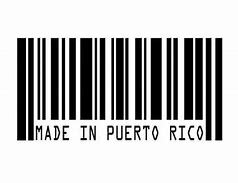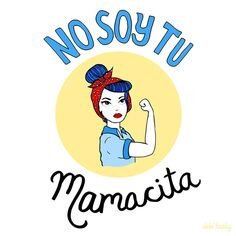Latinas Beating The Odds!
“What does it mean to be a Latina?” I was once asked. I stood silent for a minute. I wanted my response to astound the person asking. My response went a little something like:
"Soy Latina Pero No Soy Pendeja.”
Source: Pinterest / I Speak Spanglish
Translated in English, this means, “I’m a Latina woman but I am not an idiot,” which is one stereotype of Latina women—that we’re uneducated, especially if you came from poverty. What does it really mean to be a Latina? Well, in the eyes of others, kindness is better known as flirting, which is then taken as being “easy.” Don’t get me started on the stereotype of Latina women having millions of children. I don’t see the downside in having a nice big family, but hey, whatever floats your boat. Being a Latina means having strength, education, beauty, power, and just downright amazing. As a Latina, I feel that we are underappreciated and overlooked. We’re known as the underdogs. Beating the odds for us is limited, but I met three interesting Latina women that are currently working in different industries and have beaten all the odds put against them. They are all very Latina—filled with attitude, loud, and powerful.
I met these three women at different times. The first woman is someone I met a long time ago. I used to work with her in Manhattan. A total stranger to me, but connected by Boricua blood and a passion for skin care. We were both Puerto Rican women working for a Caucasian-owned company. It was really famous within its industry. Her name was Demi Lynn, and she was a beautiful café con leche colored woman. Her hair was as long as a waterfall and her eyes were the softest of browns. She’s a very loud, outspoken woman. Her attitude seeped through her pores, but she was also the best person to be around. I never knew her story. I never cared to ask until I realized I wanted to write an article about Latinas, their voices being heard, and what that meant. I automatically thought about her. Once I heard her story, it made me angry because it happened to me too: “I think Demi is a bit illiterate and tad bit ghetto. We shouldn’t have her on the floor with clients,” said the owner. Talking about the 22-year-old Puerto Rican college student from, El Barrio, East Harlem, home of the Cuchifritos frying every Saturday afternoon.
There was a certain kind of fire in the way Demi would speak. When I spoke to her about my article, I really paid attention to her mannerisms, how she would articulate her words, how she dressed, and how she carried herself. Her ex-boss’s name couldn’t be used so we’ll call her ex-boss “Bruja.” Bruja means witch. Now, let’s begin.
Source: Pinterest / El Barrio / East Harlem
Source: Etsy
Bruja was the owner of the place we worked for. A Caucasian woman who fell in love with a “higher level of care.” She wanted all of us to treat our clients as if they were royalty. I mean… they were spending thousands of dollars on treatments and beauty enhancements that their husbands could never know about. I understood, and so did Demi. Demi was a hard worker and a fast learner. When she first got the job, she didn’t know anything or anyone. She was trained of course, but was also told to not trust anyone there either. The owner never noticed Demi, until she realized that Demi wasn’t one to change her character based on the level of her position or relation to the owner. In fact, the owner hated Demi for obvious reasons that others didn’t see. Demi was in charge of a few tasks that had to be done every time she showed up at work. Like every new worker, Demi had her days where she would mess up. But for some reason, the owner kept finding little things to pick on Demi about. Her way of talking was one of them. Though, Demi’s way of speaking is exceptional… Bruja had a problem with it. “The Spanish in her voice,” she said. “It doesn’t sound professional.” Bruja wanted Demi off the phones and hidden away from clients. Not allowed to say a word, and only do her tasks.
Demi did just that, and her love for learning more about the company grew less and less. On some days, the owner had people watch Demi for her. On other days, Demi was considered a thief. On a good day, her words weren’t being twisted and people weren’t starting rumors about her. Most of our co-workers were white and close to the owner. Some knew how to kiss up, others did it for a bonus check. But when it came down to Demi and Bruja? Bruja always won. Bruja made the environment depressing. Demi said she felt like “a child on punishment for being who they were born to be.” A few months later, she was let go for no other reason than the owner not liking Demi as a person. Demi left with her head held high and was offered her dream job with people that made her feel like she never needed to change.
Source: Law Enforcement Today
The second person’s story is inspirational. I met her through my mother. A total stranger with a very powerful story. Her name is Susan Juarbe, and she was my mother’s partner when she transferred from PD to being a Court Officer in 1985. She’s a petite Puerto Rican woman. Long black curly hair and skin the color of Pan Sobao, a sweet Puerto Rican bread.
A heart of pure gold with an attitude that not many could handle or wanted to. A very outspoken person and extremely independent. When I asked her how it was being a Latina woman in the NYPDA (New York Police Department Academy), she chuckled and laughed at me. She said, “The Sergeant there was racist and sexist. He looked at me as soon as I got there and said ‘look at the junk they sent us’ and that crushed me.”
She knew she had a bigger purpose—a purpose to show people that Latina women could do anything. And so she did. She got through the academy. However, Susan was never being trained by her training officers because she was a Hispanic and a woman. 50 people, 5 women, 1 Latina. She learned from rookie cops that were on the job for 6 months. The male Hispanic cops would only help when no one was looking and the women just talked about her.
“Everyday I hate the job more and more…”
“I went from 21 to 40 in 12 months,” Susan said. '“I had to grow up really quickly in order to stay in the job I had. I was a woman, Hispanic, and in my time, every odd was against me. The Police industry was predominantly Caucasian males who hated women like me. Women who knew they were tougher than half the wannabe cops that had on the uniforms.”
“I went from playing handball with my brothers to carrying a gun during the crack epidemic.”
In December of 1985, she was assigned to work in Harlem out of 3 different precincts. When she got to one job with her partner who was Caucasian, she was ignored. There were only men at the precinct and they were all white. She wasn’t assigned a locker, job, nothing. Yet, her partner was introduced right away, received his locker and got his job.
“I had to grow thick skin to work around the people I was around.” A lot of respect had to be gained, and she got every ounce of it. Her 5’4”, 110 pound self got through the academy top in her group.
Source: Pinterest
I met the third person through a mutual friend. Her name is Melanie Crespo. She’s a 5’6” Puerto Rican woman with skin the color of dulce de leche. She was always so bubbly and carried a smile from ear to ear. She was a former marketing manager for Oscar De La Renta, Fendi, Givenchy, and more. Her story was a lot like Demi’s. She was a very hard worker and always did everything with precision. Her Vice President adored her work ethic and would always bring her everywhere she went. When her boss’s boss noticed that, the VP had a fit. The VP was an older Irish woman, and the President was an older Italian woman. She noticed that Melanie was great at what she did, so she put her to the test. She created a contest with 15 different executive editors that spoke not one bit of English or Spanish. She was to make an itinerary for all of them in their language and create their entire plan for the duration of their stay in very specific detail. She was able to communicate with every single one of those editors.
“Point of the story, she chose me to do it so I could fail and I showed her that a Latina could do it and 10 times better,” Melanie explained.
Another accomplishment Melanie was so proud talking about was when she and her team of 14 launched an entire fragrance for Oscar De La Renta—they created the brand and won an award that year.
“Even though I am a Latina I can be a part of something big too. But it takes the people around you to build you up.”
Each woman I spoke to showed me something different. I learned to fearlessly be a proud Latina. Overall, life for women will be hard—Hispanic or not. Yes, some have it easier than others, but the goal one day is for all of us to help each other grow.
One thing I noticed while talking to three powerful women was that when you put a bunch of powerful women in one room, magic can happen. Anything we touch turns to gold. But we lose sight with popularity and status. We aren’t better than one another, just a bit more stubborn. Racism is definitely still alive, and sexism still is too. It’s 2020, but it isn’t going anywhere.
Women are powerful beyond measure. We create and carry life. We are beautiful beings and some of us should start acting as such. Much love to all my women in every shade! I hope something was learned from each story. Women, Latina or not, can do anything!
Source: Ponyanarchy.com











